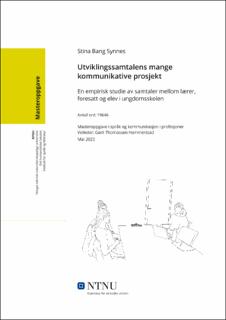| dc.contributor.advisor | Hammerstad, Gøril Thomassen | |
| dc.contributor.author | Synnes, Stina Bang | |
| dc.date.accessioned | 2022-07-16T17:20:00Z | |
| dc.date.available | 2022-07-16T17:20:00Z | |
| dc.date.issued | 2022 | |
| dc.identifier | no.ntnu:inspera:113023937:19330491 | |
| dc.identifier.uri | https://hdl.handle.net/11250/3006146 | |
| dc.description.abstract | Temaet for denne masteroppgaven er interaksjonen i utviklingssamtalen i norsk grunnskole. Masteroppgaven er et arbeid innenfor fagfeltet anvendt språkvitenskap, og er en empirisk og kvalitativ studie fundert på lyd-bildeopptak av to utviklingssamtaler ved tiende trinn ved en ungdomsskole i en større norsk by, hvor lærer, elev og mor deltok. Den overordnede problemstillingen for studien er:
Hvordan går deltakerne frem for å snakke om elevproblemer?
Studien legger til grunn et dialogistisk perspektiv på språk og kommunikasjon. Det teoretiske rammeverket for studien er Per Linell (2011) sin virksomhetsteori og tilhørende perspektiv på samtaler i samfunnet som kommunikative virksomheter. Studiens anvender virksomhetsanalyse (Linell, 2011) som metodisk innfallsvinkel i analysen av det empiriske materialet. Sentrale empiriske bidrag i studien er Baker og Keogh (1995), Förster (2013), Hofvendahl (2006b), Kotthoff (2015), Pillet-Shore (2012, 2015, 2016) og Silseth og Smette (2017).
Denne studien finner at utviklingssamtalen er en kompleks og krevende samtale å håndtere for deltakerne. Analysene viser at kompleksiteten kan knyttes til en spenning mellom utviklingssamtalens kommunikative prosjekt, og at denne spenningen kan ses i sammenheng med utviklingssamtalens triadiske deltakerstruktur. Når deltakerne snakker om elevproblemer navigerer de mot følgende tre nøkkelprosjekt: å vurdere og motivere eleven, å realisere utviklingssamtalen som et samarbeidsmøte mellom skole og hjem, og å normalisere elevens problemer. Snakk om elevproblemer medfører en grenseoppgang og forhandling om hva som er skolens og hjemmets ansvar. Elevproblemer behandles som et følsomt tema som impliserer kritikk av både elev og foresatte. Deltakerne samarbeider interaksjonelt om både å normalisere elevens problemer og at læreren ikke uttaler et elevproblem først. Læreren tilordnes rollen som samtaleleder og ‘eksperten’ som kan definere hvorvidt noe kan vurderes som et problem. Læreren ser ut til å benytte seg av rekontekstualisering som en strategi for å håndtere oppgaven om å initiere snakk om elevproblemer. Lærer og mor posisjonerer seg henholdsvis innenfor institusjonene skole og hjem, og virker å navigere mot en innramming av utviklingssamtalen som en situasjon hvor de voksne skal vurdere både eleven òg hverandre. | |
| dc.description.abstract | This thesis examines the interaction in personal development dialogues, also referred to as parent-teacher conferences in the Norwegian lower secondary school. The thesis is an empirical and qualitative study, based on sound and video recordings of two personal development dialogues, conducted at a lower secondary school in one of Norway’s larger cities, by a teacher, a mother and a student attending tenth grade. The problem of inquiry is:
How do the participants proceed when talking about student issues?
This study takes a dialogical approach to language and communication. The theoretical framework used is Per Linell’s (2011) framework of communicative activity types. Thus, the analytical approach to the empirical data in this study is ‘activity type analysis’ (Linell, 2011). Important empirical contributions to this study are Baker and Keogh (1995), Förster (2013), Hofvendahl (2006b), Kotthoff (2015), Pillet-Shore (2012, 2015, 2016) and Silseth and Smette (2017).
The results indicate that the personal development dialogue is a complex and demanding conversation to manage. The analyses show that the complexity is tied to a tension between the many communicative projects of the dialogue, and that this tension is related to the dialogue’s triadic participant structure. When talking about student issues, the participants navigate towards the three following key projects: to evaluate and motivate the student, to carry out the personal development dialogue as a collaborative meeting between school and home, and to normalize the student’s issues. Talk about student issues entails a marking of boundaries between home and school, and a negotiation of what is considered as the responsibility of these two. The conversational topic ‘student issues’ is treated as a sensitive topic which implies critique of both student and parents. The participants collaborate interactionally to both normalize the student’s issues, and to avoid the teacher being the first one to express student issues. The teacher is granted the role as the leader of the conversation and the expert with the right to define what is to be considered as student issues. It appears from the analyses that the teacher uses recontextualization as a strategy when handling the task of initiating talk about student issues. The teacher and the mother position themselves within the two institutions school and home. They appear to navigate towards a framing of the personal development dialogue as a situation where the adults are to evaluate both the student and each other. | |
| dc.language | nob | |
| dc.publisher | NTNU | |
| dc.title | Utviklingssamtalens mange kommunikative prosjekt: En empirisk studie av samtaler mellom lærer, foresatt og elev i ungdomsskolen | |
| dc.type | Master thesis | |
